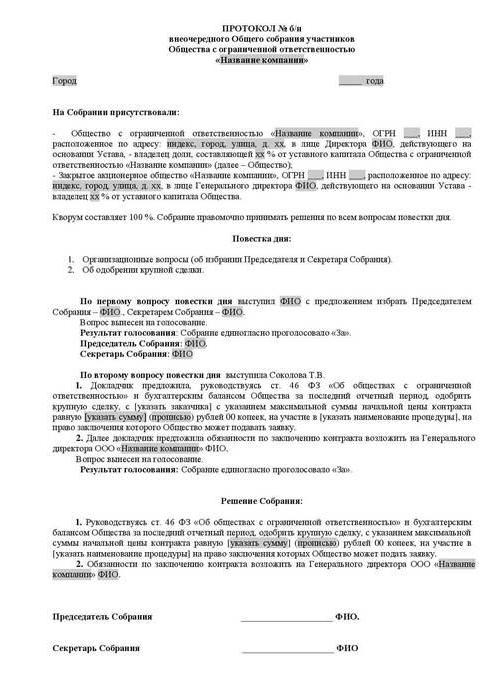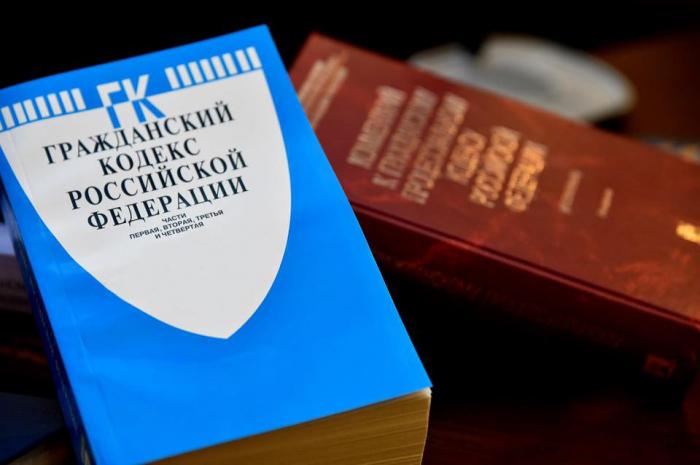Federal Law No. 343 amended Federal Law No. 208 and No. 14. The adjustments touched part of the provisions governing major transactions and related party transactions. Their qualifications, the procedure for internal coordination, and disclosure of information about them were changed. In addition, the adjustments touched on ways to protect participants in the turnover, the rules by which major transactions and related-party transactions are appealed. Let's consider innovations in detail. 
Controlling person
In accordance with the amendments made to the Federal Law No. 343, affiliation is excluded from the criteria by which an interested-party transaction for an LLC is qualified. Instead, the term “controlling entity” is introduced. This innovation significantly narrowed the range of entities that may be recognized as interested. The fact is that “affiliation” is a broader concept than “control”. If the former involves influence, the latter is the ability to determine the decision to complete an interested party transaction. The opportunity to act as a controlling person remained for the members of the board of directors, the collegial management structure, the sole body, as well as the entity entitled to give binding instructions.
Specifics of Innovation
Analyzing the concept of “controlling entity”, it is easy to see that it completely duplicates the similar term present in the Law governing the securities market. In this case, the legislator has chosen the way of formalizing the criteria, without considering supervision as a basis for accountability. According to experts, various difficulties will arise in law enforcement practice in this regard. It is worth saying that since 2017, according to the legislation, for the purpose of normative regulation of related party transactions, the municipality, the Russian Federation or its subject are not recognized as controlling entities.
Grounds
What is an interested party transaction? This category may include contracts that are concluded by persons defined by the rules, their spouses, children, sisters / brothers (full and half), parents, adoptive parents / adoptive entities or entities controlled by them (including organizations) with a number of special conditions. In particular, an interested-party transaction is recognized as such if these persons simultaneously act as participants in another legal relationship. Moreover, they may be a party, beneficiary, intermediary, representative. These are far from all the criteria by which an interested party transaction is determined. The contract will be assigned to this category even if these entities occupy a position in the governing bodies of a legal entity that is an intermediary, beneficiary, representative at the time of drawing up the agreement. It is worth saying that the current legislation does not provide for legal entity participants the opportunity to establish other criteria in the charter. Accordingly, any other transaction is not a related party transaction, even if it is specified in the constituent documentation. 
Property Valuation
The rules for determining the monetary value of material assets have also been amended by Federal Law No. 343. Since January 2017, the valuation procedure has not been made dependent on the number of participants. The main criterion is the publicity or non-publicity of the company.In the latter case, the price of the property in relation to which the transaction with the joint stock company is concluded is determined by a majority of votes on the board of directors. In this case, the legislator establishes an important requirement. These persons should have no interest in the transaction by the company. As for public entities, in addition to the specified criterion, mandatory compliance with a number of requirements is added (83 article of the Federal Law No. 208). It is allowed in the charter to establish the need for more votes than is provided for by law.
Nuances
If the number of directors who do not have an interest, and in public education - additionally meeting the requirements stated in Article 83, paragraph 3 of the Federal Law No. 208, is insufficient (will be less than the quorum established by the charter), the property is evaluated unanimously by the board members. However, the votes of retired members may not be taken into account. This is allowed if the charter does not stipulate that the assessment should be carried out by decision of the meeting, adopted according to the rules for approving interested-party transactions.
Exceptions
The amended Federal Law No. 14 and 208 provide for several circumstances in the presence of which the contract cannot be considered as a related party transaction. So, for example, the corresponding regime does not apply to some agreements drawn up as part of the ordinary activities of the enterprise. In order for the contract not to act as a related-party transaction, the association must enter into similar legal relations for a long period under similar conditions. Conducting a comparative analysis of this provision and paragraph 5 of Article 83 of the Federal Law No. 208 in the previous edition, one can notice an important feature. Until 2017, the execution of such agreements could be agreed with the board of directors only within a certain time frame - until the next annual meeting. An important distinction of the current wording is that the terms of the agreement should now be compared with all similar association contracts in the conclusion of which there is no interest. Another important requirement of the new edition. Agreements must be drawn up repeatedly over an extended period. 
Interested party transaction approval
Consent before the conclusion of the contract can be obtained from the board of directors or the meeting of shareholders. The legislation defines the circle of persons who can apply with the corresponding requirement. This is the sole governing body, members of the collegial executive structure, board of directors or shareholder with at least 1% of voting shares. If an interested party transaction is agreed for the LLC, then the shares of the participants in the aggregate should be at least 1% of the authorized capital.
Possible problems
According to experts, the legislator, setting criteria for compliance with which it is possible to obtain approval of a related party transaction, has not determined the time frame within which these entities from the moment of notification may require the convening of a meeting or board of directors. Experts indicate that there may be situations when a positive response will be received after the contract is completed. And in some cases, a decision to approve an interested party transaction may come after its terms are fulfilled.
General approval rules
The procedure by which a decision on approval is made is different for public and non-public associations. Consent may be given by the general meeting. In this case, a protocol is drawn up. Interested party transactions may also be agreed by the board of directors. In any of these cases, however, a number of rules apply.First of all, the requirements for the content of the document are established, according to which the transaction with interest is approved (a sample of the act is presented in the article). In addition, persons associated with the execution of the contract should be excluded from participation in the discussion. Accordingly, their votes are not counted. The exception is situations stipulated by clause 4.1 83 of article ФЗ No. 208. The board of directors must make a decision by a majority, unless otherwise specified in the charter.

Qualified Requirements
The possibility of their establishment is provided for by Federal Law No. 208. Qualified requirements are determined by the organization itself. They are fixed in the charter. When establishing qualified requirements, a quorum should also be determined for holding meetings of the board of directors, which, in turn, should consist of at least two persons. If the number of entities for approval by which an interested party transaction is presented (the sample agreement in terms of content does not differ from the ordinary agreement) is less than the established by the charter, it is discussed by the shareholders.
Meeting of participants
The legislation provides for several cases when shareholders agree on an interested party transaction. These include situations:
- When the subject of the contract or several interrelated agreements is property worth (according to information from the accounting documentation) 10% or more of the book price of assets for the last reporting calendar number. The establishment of the specified minimum threshold significantly liberalizes the approval of transactions. Prior to the approval of amendments to Federal Law No. 343, agreements were required for approval, the value of which is more than 2%.
- If the transaction involves the sale of ordinary or preferred shares, which make up more than 2% of previously placed, as well as into which issue securities can be converted, if the charter does not specify a smaller amount.

At the same time, rules are provided for special situations:
- If upon conclusion of an agreement by a non-public association requiring consent from the general meeting, all shareholders holding voting shares will be recognized as interested, and any of them shall require approval, it shall be submitted by the majority participating in the discussion. In this case, the right to apply for approval of the agreement should be fixed by the charter.
- If at the conclusion of the contract all shareholders who own voting shares are recognized as interested, and a third party is interested in the transaction, approval of the agreement is carried out by the majority participating in the discussion.
The specified order is considered as an exception to the general rules. 
Opportunities for Non-Public Associations
These companies are subject to discretionary regulation. The charter of an association may establish an agreement procedure that differs from that provided for in the legislation. The constituent document may also determine that the relevant provisions of the law do not apply when the enterprise carries out its activities. Such provisions of non-public education shall be introduced at its creation, as well as in case of amendments to the charter. The corresponding decision should be taken at the general meeting unanimously. A similar rule applies in case of exclusion from the constituent document of certain items. Experts note that this opportunity is to some extent revolutionary. By applying the rule, shareholders, at their discretion, can unanimously exclude the need to reconcile the related party transaction. According to experts, this opportunity is useful in the framework of family business, as well as for economically dependent economic entities.
Approval in LLC
In the case of the formation of the board of directors, the procedure may be included in its competence.The relevant provision should be established by the charter. However, legislation provides a number of exceptions. They relate to transactions whose price or value of property is more than 10% of the balance sheet assets. The latter is determined in accordance with the financial statements for the last control period. The decision on approval is taken by a majority of non-interested directors. This rule is valid if the charter does not fix the need for a larger number of votes. The decision can be made by shareholders who are also not interested in the transaction. The principle of dispositivity also extends to these associations. As in non-public organizations, the charter of an LLC may fix an agreement procedure different from that established by law, or provide for the non-application of the relevant provisions.

findings
Significant changes that affected transactions with interest are thus focused on simplifying the procedure for negotiating contracts that are insignificant in value. Along with this, shareholders and the board of directors are currently offered ample opportunities. In particular, they can, at their own discretion, freely establish the approval procedure, exclude the need to approve related-party transactions. According to experts, in general, regulatory regulation can significantly facilitate the activities of holdings. Existing provisions of the law relieve groups of companies from the need to obtain consent when concluding contracts with the participation of subsidiaries. In those associations in which there are shareholders (participants) with different, often conflicting interests, where it is not possible to reach a unanimous decision, the approval procedure has not become more comfortable. First of all, the problem is created by the uncertainty of the grounds and terms for making a claim by authorized entities.
Invalidation
For transactions concluded with an interest, the contest is regulated by the rules of article 174 of the Civil Code (clause 2). Initiation of proceedings shall be carried out at the suit of the association or its shareholders, who own in total at least 1% of the voting shares. The specified requirements are provided for JSC. As for legal entities with limited liability, entities that own at least 1% of the total number of votes of all participants can file a lawsuit. It is worth noting that the new provisions of Federal Law No. 14 and No. 208 do not connect the ability of board members and shareholders to challenge an interested party transaction with the fact that they submitted a request for a meeting to be agreed upon. According to a number of experts, this circumstance entails significant uncertainty for associations. It is expressed primarily in the possibility of delayed contestation of contracts.
Rules 174 of the article
As the norm indicates, a transaction concluded by a body acting on behalf of a legal entity without a power of attorney, to the detriment of its interests, may be declared invalid by the court. The lawsuit is accepted for consideration if the other party to the relationship knew or could have been aware of obvious harm to the company or there were factors indicative of collusion or other joint actions of the guilty party and the other party. In article 84 of the Federal Law No. 208 (Clause 1), as well as Art. 45 Federal Law No. 14 (Clause 6), you can recognize the invalidity of a transaction if it was concluded to the detriment of the interests of the enterprise and it was proved that the counterparty should have known or knew that it was an agreement in the company in which there was an interest, or that there is no consent to commit it. At the same time, the latter circumstance in itself cannot be considered by the court as a ground for contestation. It is also worth noting the difference between agreements of interest and large transactions.When contesting the latter, the subjects do not need to prove damage (causing losses, other adverse consequences from the conclusion of the contract). To recognize the invalidity of an interested party transaction, confirmation of the harm done to the interests of the economic entity is required. 
Conditions
Legislation assumes the existence of damage caused to the interests of society when concluding an agreement, subject to a number of requirements. They are:
- Lack of consent to the commission or subsequent approval of the contested transaction.
- The subject who filed the claim was not provided with information relating to the contract at his request. This, in particular, is about creating obstacles to access to documents and other materials certifying that the agreement does not cause harm to the enterprise, concluded on conditions that do not significantly differ from those in force on the market, etc.
If the interested party transaction was concluded in the absence of approval for the transaction, the shareholders holding at least 1% of the securities, or a member of the board may apply to the association with the requirement to provide information related to it. Data must be received within a period not exceeding 20 days. from the moment of acceptance of the corresponding statement. By setting this rule, the legislator sought to ensure the protection of these individuals. However, according to experts, it can provoke significant instability in economic relations. The implementation of this rule may be considered as the basis for the potential opportunity to require approval for an already concluded agreement. According to lawyers, it is advisable to apply the rules of the subsequent approval procedure in order to exclude negative consequences. The presumption of damage is intended to stimulate the association, through its authorized bodies, of the proper performance of the duties that were assigned to them by the charter, in order to provide timely and complete and reliable information on transactions in which there is an interest.